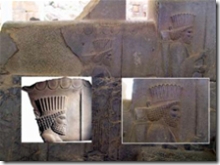Rejecting Renvoi: Iran v Berend
BAILII has just published the intriging judgment in Iran v Berend [2007] EWHC 132 (QB), which was handed down last Thursday (1 February 2007).
 The case concerned a fragment of an Achaemenid limestone relief, believed to originate from the first half of the fifth century B.C in Persepolis (see some of the background to the dispute on Iran's Cultural Heritage News Agency website – be wary of the obvious bias, however.) Mme Denyse Berend allegedly acquired title in the fragment after it was sold to her through an agent at a New York auction in October 1974. Mme Berend attempted to sell the fragment at auction in July 2005, but Iran sought (and was granted) an injunction to prevent the sale.
The case concerned a fragment of an Achaemenid limestone relief, believed to originate from the first half of the fifth century B.C in Persepolis (see some of the background to the dispute on Iran's Cultural Heritage News Agency website – be wary of the obvious bias, however.) Mme Denyse Berend allegedly acquired title in the fragment after it was sold to her through an agent at a New York auction in October 1974. Mme Berend attempted to sell the fragment at auction in July 2005, but Iran sought (and was granted) an injunction to prevent the sale.
The defendant, Berend, quite sensibly argued that, as the fragment is movable property, the English conflict of laws rules dictate that French law governs the question of title to the fragment, since the defendant obtained her title to it at a time when the fragment was in France (i.e. on delivery in November 1974). She would obtain it either by good faith or by prescription under Article 2262 of the French Code, on the basis that she had possessed it for more than 30 years.
The claimant, Iran, sought to argue that the English court should not simply apply French domestic law, but should apply also the French conflict of law rules, i.e. the English court should apply the doctrine of renvoi. The claimant argued that a french court would apply an exception to the lex situs rule, and apply Iranian law (as the law of the state of origin), which would in turn demand return of the fragment.
So what of renvoi in English law? Eady J. stated:
Whether or not it should apply in any given circumstances is largely a question of policy. To take examples, it has been applied most frequently in the context of the law of succession; on the other hand, it is not applied in the fields of contractual relations or tort. It seems that the modern approach towards renvoi is that there is no over-arching doctrine to be applied, but it will be seen as a useful tool to be applied where appropriate (i.e. to achieving the policy objectives of the particular choice of law rule): see e.g. Raiffeisen Zentralbank Österreich AG v Five Star Trading LLC [2001] QB 825, at [26]-[29], per Mance LJ; Neilson v Overseas Projects Corporation of Victoria Ltd [2005] HCA 54, High Court of Australia (see Reid Mortensen's excellent article in the Journal of Private International Law on Neilson)
Eady J. analysed the crumbs left by various decisions on other forms of property on whether or not the court should accept a renvoi. Ultimately, it seems, weight was given to the following passage in Dicey, Morris & Collins:
As a purely practical matter it would seem that a court should not undertake the onerous task of trying to ascertain how a foreign court would decide the question, unless the advantages of doing so clearly outweigh the disadvantages. In most situations, the balance of convenience surely lies in interpreting the reference to foreign law to mean its domestic rules
Eady J. found particular solace in the judgment of Millett J. in Macmillan v Bishopsgate Investment Trust plc (No3) [1995] 1 WLR 978:
…it seems from the context to be clear that Millett J was endorsing an established policy in English law of choosing the lex situs in the sense of domestic law. Otherwise it would hardly make sense for the judgment to reject the doctrine of renvoi. I can find no reason to differ from Millett J and to hold, for the first time, that public policy requires English law to introduce the notion of renvoi into the determination of title to movables.
As a result, Eady J. held, "I determine the first question in favour of the Defendant. I hold that, as a matter of English law, there is no good reason to introduce the doctrine of renvoi and that title to the fragment should thus be determined in accordance with French domestic law."
A sigh of relief all round, then. French domestic law was unequivocal that Mme Berend was entitled to the fragment, and so she succeeded. Eady J. did, however, go on to ask whether a French court would have applied Iranian law for the "sake of completeness". Just to rub it in, Eady J. found he was not so persuaded. One wonders whether there will be any further appeal from Iran, although after Mr Justice Eady's judgment they must be fairly discouraged.
Update: We have been told that the possibility of an appeal by Iran is extremely unlikely.
Many thanks to Derek Fincham (University of Aberdeen) for the story and his excellent write-up over on the Illicit Cultural Property blog.


